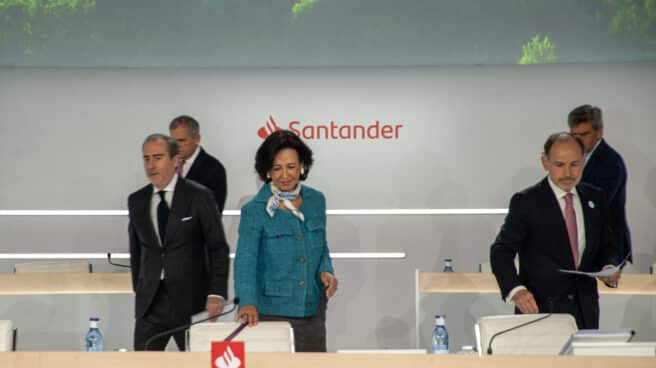

The European Central Bank has been raising interest rates at all its meetings for just over a year. The goal is clear: reduce consumption and thereby reduce inflation. One of the main consequences is that the prices of loans and mortgages rise, so the demand for them falls. Banks have tightened their lending criteria more than expected, according to the ECB’s third-quarter bank lending survey. However, Banco Santander insists that they are not tightening lending conditions, and that the balance sheet is falling because demand is greater.
In fact, Hector Grisi, the company’s CEO, and José García Cantero, the CFO, note that the percentage of mortgage loans issued is the same as before. “We didn’t turn off the tap and didn’t tighten the conditions”- Garcia Cantero assured during the presentation of the third quarter results. However, he clarified that the outstanding loan is decreasing as fewer applications are being submitted.
These statements contrast with a lending survey also carried out by the Bank of Spain, which shows that credit supply maintained its pace of contraction in the third quarter. Both grant criteria and general conditions for new loans generally tightened for the sixth quarter in a row in parallel with interest rate hikes undertaken by the European Central Bank (ECB).
In terms of criteria, the level of tightening was similar to the previous quarter in the case of companies, while in lending to households it was slightly more pronounced. Under certain conditions, the evolution was more moderate for companies and similar for households.
“The restrictive evolution of credit supply will respond to an increase in the risks perceived by financial institutions, to a lower tolerance towards them and, to a lesser extent, to a deterioration in their liquidity,” the Bank of Spain indicated at the same time. time, which explained that the number of rejected loan applications has increased in all forms.
According to Banco Santander Spain, Production of new mortgages fell 20% during this period.. Despite the decline, this new production accounts for 16% of the market. The bank notes that at the end of the year the trend will continue, that is, the volume of new mortgage loans will continue to fall.
Grisi also cited a reported 2% drop in lending, which he attributed to central banks raising rates to stem inflation. “We are seeing a significant drop in demand for loans”, indicates and explains that this is exactly what monetary policy strives for – “tightening the economy.” When interest rates rise, demand for credit falls “because people don’t have enough money to pay off their car mortgage,” he adds.
The CEO assures that this increase in rates has not yet been fully transferred to loans, and adds that mortgages in Spain are cheaper than in other countries. However, customer margins – what they charge for loans and what they pay for deposits – increased this quarter to 3.37% (for all customers, both companies and individuals). That is, the cost of deposits in Spain is 0.9%, and the loan yield is 4.27%.
Despite this difference, Banco Santander insists that This monetary policy was not translated into loans. and assures that the difference with the bonus is very big. “The mortgage term is 20 to 30 years. If you apply for a fixed-rate mortgage, the bank must offer you a favorable interest rate for the life of the loan, which is why we compare ourselves to bonds rather than bonds. with what is currently being paid on the deposit,” explains the general director.
Higher mortgage amortization
The bank also records an increase in the amortization of mortgage loans. Grisi notes that clients are using savings they had, especially since the pandemic, to reduce their debt. In the first three quarters, Santander recorded depreciation of 3.5 billion euros and expects a further 1.5 billion euros to be added in the fourth quarter.
This figure will mean that Monthly depreciation amounts to just under 390 million euros. monthly, which is in line with the previous quarter, when about €300 million was amortized monthly. A figure they plan to extend until the end of the year.
Source: El Independiente